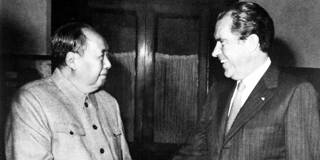Much has changed since the 1970s, when Richard Nixon and Mao Zedong devised the “one China” formula to paper over their differences on Taiwan's status. But, if combined with other measures to bolster deterrence against any sudden acts of aggression, this 50-year-old policy can still help to keep the peace.
CAMBRIDGE – Might China try to attack Taiwan by 2027? The outgoing chief of the US Indo-Pacific Command, Philip Davidson, thought so in 2021, and he recently reaffirmed his assessment. But whether the United States and China are destined for war over the island is another question. While the danger is real, such an outcome is not inevitable.
China considers Taiwan a renegade province and a remnant of the Chinese civil war of the 1940s. Although US-China relations were normalized in the 1970s, Taiwan remained a point of contention. Nonetheless, a diplomatic formula to paper over disagreement was found: Chinese on both sides of the Taiwan Strait agreed that there was just “one China.” For the Americans, refusing to recognize any de jure declaration of independence by Taiwan would ensure that the island’s relationship with the mainland would be settled by negotiation, not force. China, however, never ruled out the use of force.
For years, the US policy was known as “strategic ambiguity,” but it could be better described as “double deterrence.” The US wanted to deter China from using force, but also to deter Taiwan from provoking Beijing by declaring formal independence. That meant providing Taiwan with weapons for its self-defense, but not issuing a formal security guarantee, since that might tempt Taipei into declaring independence.

CAMBRIDGE – Might China try to attack Taiwan by 2027? The outgoing chief of the US Indo-Pacific Command, Philip Davidson, thought so in 2021, and he recently reaffirmed his assessment. But whether the United States and China are destined for war over the island is another question. While the danger is real, such an outcome is not inevitable.
China considers Taiwan a renegade province and a remnant of the Chinese civil war of the 1940s. Although US-China relations were normalized in the 1970s, Taiwan remained a point of contention. Nonetheless, a diplomatic formula to paper over disagreement was found: Chinese on both sides of the Taiwan Strait agreed that there was just “one China.” For the Americans, refusing to recognize any de jure declaration of independence by Taiwan would ensure that the island’s relationship with the mainland would be settled by negotiation, not force. China, however, never ruled out the use of force.
For years, the US policy was known as “strategic ambiguity,” but it could be better described as “double deterrence.” The US wanted to deter China from using force, but also to deter Taiwan from provoking Beijing by declaring formal independence. That meant providing Taiwan with weapons for its self-defense, but not issuing a formal security guarantee, since that might tempt Taipei into declaring independence.